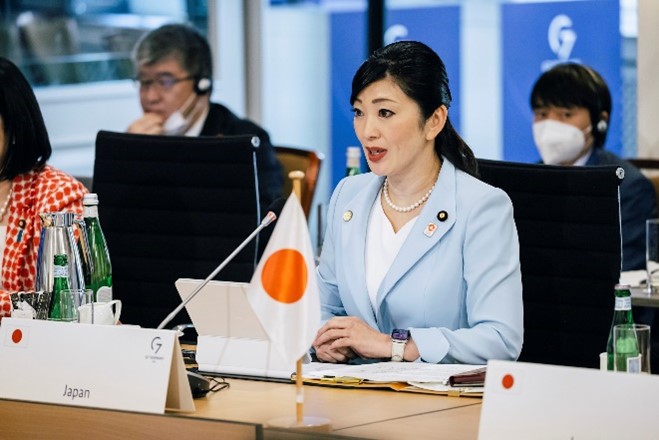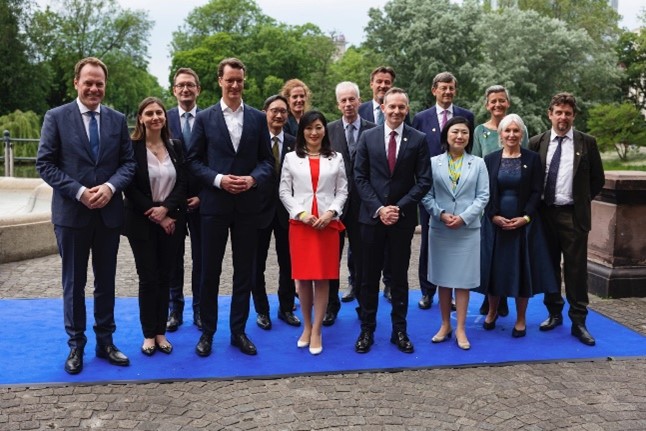- Home
- News Releases
- Back Issues
- May FY2022
- METI Parliamentary Vice-Minister Yoshikawa Participates in the G7 Digital Ministers' Meeting
METI Parliamentary Vice-Minister Yoshikawa Participates in the G7 Digital Ministers' Meeting
May 12, 2022
Joint Press Release with the Digital Agency and Ministry of Internal Affairs and Communications
Ms. Yoshikawa Yumi, Parliamentary Vice-Minister of Economy, Trade and Industry, attended the two-day G7 Digital Ministers' Meeting held in Dusseldorf, Germany on May 10 (Tue.) and 11 (Wed.). The ministers discussed current issues related to digitalization and related frameworks, and adopted a Ministerial Declaration.
Chaired by Germany, the G7 Digital Ministers' Meeting was held with the theme "Strong together." The discussions covered six fields: (1) digitization and the environment, (2) standardization, (3) Data Free Flow with Trust (DFFT), (4) competitive digital markets, (5) online safety (eSafety), and (6) electronic transferable records (ETRs). They also included cyber resilience in relation to Russia's invasion of Ukraine.
Parliamentary Vice-Minister Yoshikawa, Digital Minister Makishima, and Vice-Minister for Policy Coordination Sasaki (Ministry of Internal Affairs and Communications) attended.
During the meeting, Parliamentary Vice-Minister Yoshikawa stated in the discussions related to the Ministerial Declaration that regarding the implementation of DFFT—a concept that Japan advocated in the 2019 G20 Osaka Summit—in cooperation with the G7, METI was progressively examining proposals for pragmatic solutions that use an evidence-based approach and take into account the current situation regarding cross-border data transfers.
Regarding data centers and other digital infrastructure, Parliamentary Vice-Minister Yoshikawa asserted the importance of working to make the digital sector green, given that the rapid progress of digitalization in various fields will massively increase the volume of data processed, and this in turn will raise the energy consumption of digital infrastructure.
In addition, in the roundtable discussion with the B7, Parliamentary Vice-Minister Yoshikawa made statements and exchanged views about the growing importance of smooth cooperation between the public and private sectors in order to implement policies to maximize the benefits of digitalization. In particular, she said that it would be important that not just governments but also all stakeholders including industry involved with the utilization of data cooperate in order to progressively flesh out DFFT.
Based on these discussions, the ministers adopted a Ministerial Declaration to the effect that they would aim to encourage multi-stakeholders to address the COVID-19 pandemic, climate change, the environment, and other global issues and make the economy and society more prosperous and resilient; that they would support innovation, strengthen respect for democratic values and universal human rights, and continue coordinated efforts to maintain an open, interoperable, reliable, and safe Internet; and that they would oppose any measures that could hamper these values and rights.
The main points the ministers made in the Ministerial Declaration are as follows:
- They condemned in the strongest possible terms Russia's military incursion into Ukraine. They agreed to improve cyber resilience by expanding cooperation on measures against cybercrime and by improving and sharing awareness of cyber threats regarding digital and communication infrastructure.
- They reaffirmed that digital solutions can help strengthen environmental protection and achieve net zero greenhouse gas emissions. At the same time, increasing use of digital technologies and services such as data centers and telecommunications networks is raising demand for energy and resources. They will therefore seek ways to utilize digital technology better, including discussing the issues with experts and stakeholders.
- They agreed to strengthen G7 cooperation toward standardizing digital technology in a manner that is open, led by private sector, voluntary, and consensus-based. They welcome the high-level multi-stakeholder events due to be held in September 2022.
- They affirmed that Data Free Flow with Trust (DFFT) underpins innovation, prosperity, and other democratic values. They also reaffirmed their shared democratic values and determination to deal with measures that will restrict the benefits of DFFT, and stated that they are opposed to digital protectionism. They agreed to deepen shared understanding and strengthen efforts toward identifying commonalities, complementarities, and elements of convergence between existing regulatory approaches and measures, in order to promote DFFT and future interoperability.
- They will deepen international cooperation toward tackling issues regarding digital competition, including in relation to regulating platforms. They will support the discussions between G7 policy makers due to be held in Autumn 2022. They welcome the ongoing exchange of information and experience between G7 competition authorities.
- They reaffirmed their commitment to improving online safety and reducing illegal and harmful content and activities on the Internet. They welcome the multi-stakeholder dialogues coming up in Autumn 2022.
- They will continue the dialogues between experts in the public and private sectors about designing a legal framework for promoting electronic transferable records and about exchanging documents and information regarding transporting electronic cargo. They will further pursue cooperation on electronic transferable records as agreed in the 2021 G7 Summit, and support efforts to promote the digitalization of information in international trade.
Related Links
- MINISTERIAL DECLARATION G7 Digital Ministers' meeting (May 11, 2022)

- G7 Digital Ministers' Track - Annex 1] G7 Action Plan for Promoting Data Free Flow with Trust

- Joint Declaration by the G7 Digital Ministers on cyber resilience of digital infrastructure in response to the Russian war against Ukraine (May 10, 2022)
Division in Charge
Office of International Affairs, Policy Planning and Coordination Division, Commerce and Information Policy Bureau

